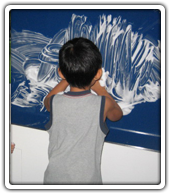 Introduction
Introduction
Until recent years, intervention was looked at from a rehabilitative perspective. That is, intervention is only provided when developmental issues are already evident and is impacting a child's life. The rise of early intervention as a model of practice for assessing, intervening and advancing a child's development has been a much needed shift in the provision of services.
What is the basis for early intervention?
Development of an infant’s movement patterns, body percept, form and space perception, motor planning, interaction-communication abilities, play skills, learning abilities, socialization skills and self care skills is directly related to how a child processes sensory information. Therefore, difficulties with processing sensory input at an early age will contribute to delayed and atypical development. It is also widely recognized that infants who do not acquire age appropriate postural control and movement patterns also develop atypically. Developmental issues whether sensory or motor based often predisposes the child to be “at risk” of developing further challenges in the motor, language, emotional, cognitive, social and learning domains.
Normal Development: A guideline for assessment and intervention
Understanding typical development provides the basis for assessment, a frame of reference for intervention and an understanding of atypical compensatory behaviour. Early identification of possible areas of deficit is essential for both avoiding and limiting further development of difficulties. Gaining an insight on a child “at risk” of developmental issues also enables parents to understand the impact of these deficits on their child’s functional and developmental issues.

Intervention: Advocacy, Prevention and Remediation
The KIDZ Early Intervention Program is a program that is developed to assist parents with children with or is “at risk” of having developmental issues. Understanding how to support these children with sensory processing and/or motor based issues will be done via a multi-pronged and multi-frame of reference approach.
Caregivers of each child will be equipped with the knowledge of normal development and the implications of atypical development. This will lead to parents being better advocates of their child’s needs as well as equipping them with the tools to being better facilitators in their child’s development.
Handling and intervention facilitation techniques will be taught with the two-fold purpose of both assisting with remediation and arresting/limiting atypical compensatory patterns.
Who would benefit from the Early Intervention Program?
Preterm infants and individuals presenting with issues in:
- Motor development
- Feeding
- Regulation (i.e. sleep)
- Play
- Engagement and interaction
Program Objectives
For the Child:
- Identify and assess atypical development and behaviours,
- Identify missing milestones which are foundations for successful development,
- Identify and rectify sensorimotor deficits that may lead to growth of limiting abnormal compensatory patterns.
For the Caregivers:
- Understand normal development,
- Understand sensory processing and its impact on different areas of development,
- Understand the impact of alignment, postural stability and movement patterns in relation to development,
- Learn handling, facilitation and intervention strategies and techniques to facilitate development.



